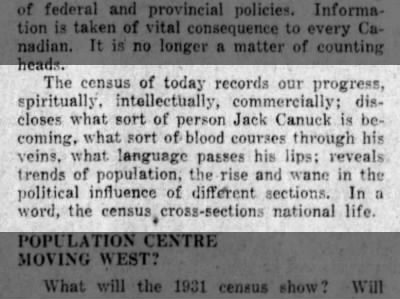Looking forward to hearing more about Nordic genealogy this week.
More about the Nordic Genealogy Conference - on right now virtually - and the National Nordic Museum in Seattle, Washington, USA here: https://www.nordicmuseum.org/genealogyconference
The Census & Jack Canuck, "How Many And Who Are They? Canada Plans the Census" by Grant Dexter, The Province, 30 November 1930, page 37.
Most researching their Nordic families in Canada will be looking at the historical censuses. We are often 'spoiled for choice" as a number of census databases are available, some free as is Library and Archives Canada (LAC). See the LAC Census page for links to the free databases there and to much helpful information about the censuses and searching, including common abbreviations. The FamilySearch Wiki has a good Canada Census database chart showing LAC and the other choices.
Depending on which database you choose, you may be offered specific details to add to your tree. As I mentioned recently in another article, I hope you will want to go beyond the hints. Occupation, for example, is included, as is ethnicity or 'race'. (These are historical documents and you will see terms used on the census or in the instructions that we would not use this way today.) This information can help you determine whether you have the correct individual or family, and open up doors to learning more about their lives in Canada and, if immigrants, before.
If researchers live in Canada, they'll likely have had the experience of talking to a census enumerator at their door or filling out a census form themselves. I remember quizzing my father later about his answers. I didn't think he had been 'truthful' and I was quite surprised by that. (Although I didn't quiz him till after the enumerator had left.) He only wanted to be 'Canadian' and wasn't going to say he knew where his family was from. In one sense, he was truthful, sort of. We did know for sure his mother was born in England. But at that time, it was only the father's line they were interested in. Dad did know his father was born in Toronto, Ontario, but did not know for sure where his paternal grandfather was born. I was pretty sure even then he was from England, but we had no evidence!
Looking at the census answers we always need to remember that individuals had their own ideas, worries and reasons for answering questions a certain way. We can't take any information for granted. Still the census is good evidence for their being (usually) in a certain place at a certain date with (or without) certain people. See below.
We also need to remember that enumerators were the same with their own ideas, worries and reasons for doing things a certain way. And they were bound by obligations and any number of questions and regulations that changed from census to census.
Statistics Canada has a useful timeline of censuses outlining some of the changes up to 2016. The 1871 census, for example, was the first to enumerate people de jure - according to their usual place of residence, not where they were.
Family Tree Knots has links to most of the Canada Census Enumerators Instructions 1851/52-1921. These often explain 'odd' entries and abbreviations we see.
Here is a link to the 1926 Census Instructions to Commissioners and Enumerators. Note for instance the 1926 instructions regarding those born in Russia, "before the war", later Finland, to enter "Finland"as their place of birth (the province/state or region, or a city or town), not "Russia". (Most of the Instruction booklets are on the Internet Archive and if you are using LAC's free census indexes and images, links to the Enumerators' Instructions are in the information sections.)
The Canada Year Book, 1948-1949, Chart, "Immigrant Arrivals, 1867-1947", Dominion Bureau of Statistics, Department of Trade and Commerce, Canada, Ottawa, 1949, between pages 178/179. Statistics Canada Open Licence. Canada Year Book Historical Collection, Archived Content.
For much more about Canada's historical census, read Dave Obee's book, Counting Canada, A Genealogical Guide to the Canadian Census, 2010.
Another article in this series will be about researching the historical content of the census, particularly as applies to immigrants to Canada.


1 comment:
I enjoyed your post about a subject that I know little about. I love learning research trips from bloggers. #geneabloggers
Post a Comment